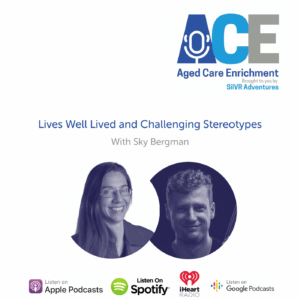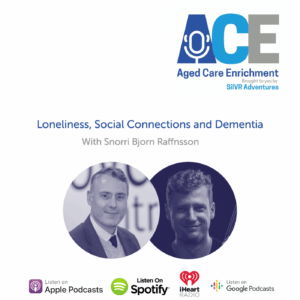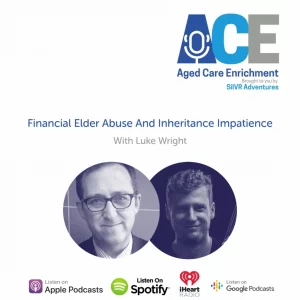Transcript
Ash de Neef: Well Laurie, thank you for joining us on the podcast today.
Laurie Buys: Thanks for having me. I’m really pleased to be here.
Ash de Neef: We’re very happy to have you. Could we start with bit about you and background?
Laurie Buys: Sure, I guess there’s two things about me. One is that I am a professor at the University of Queensland and I’m also the Director of the Healthy Ageing Initiative there. Which is bringing together researchers and industry and government to address issues around longevity, ageing, aged care all sorts of – everything all ageing.
But there’s also about me as a person. I came from a very small rural town in West Virginia in America. And that town was the center of the area, and we only had 4,000 people. And so it was agriculture and farming and so forth. And I grew up in a town where everyone had a role. Everyone had a job and everyone had a purpose, regardless of how old you were.
So I had no idea that older people were a burden or a problem until I came to Australia. When I married an Australian, we came to Australia many years ago, my mother-in-law said to me that she didn’t want to become a burden on our family. And I had absolutely no idea what she was talking about. Like literally had no idea.
And so, having lived here for now 30 some years I understand that. And it’s really interesting how we actually contextualise the people around us and the roles that they play, and it has a real bearing on then how we as a society value people.
So when I first came to Australia I was working in Adelaide as a rehab counsellor. And I was getting injured workers back to work. And for some reason, all of a sudden I started getting all the injured workers who were over 50. And I was getting the same referral from the doctors, and the employer, and the union for the same person.
And what I realised in hindsight, it was because I had no idea that the person was too old to go back. I just was like well, he’s 50. Age wasn’t an issue. He had an injury or she had an injury, so let’s get them all back to work. Cause that was what was good for them. It was good for the organisation and good for everyone.
So I was very successful, at getting people back to work. And so looking back on that, that has set my whole world and my whole outlook on life is that we have intrinsic value for our whole life.
Up until the day we take our last breath we have intrinsic value and can contribute. So that is where I’m coming from. In terms of the things that I research and the lens that I use.
Ash de Neef: That’s really context. And if we could just ask about your time in West Virginia. And you’re talking about older adults, they’re having roles in society and being actively involved in the community. What sorts did you see your parents and grandparents, and older adults doing?
Laurie Buys: I guess it’s around about how the community functions and there’s a difference between having a paid job and having occupation. Not everyone had a paid job throughout their whole life, but everyone had occupation. So that if there was a wedding or a funeral or a birth or a death, there was everyone pitching in to give a hand cooking or looking after kids or taking care of one another. If we needed snow shoveling or we needed, the cows brought in from milking, various things were done by various people.
When I was in kindergarten, I would always walk home. We walked home for a couple of miles and you knew who just stopped to whose houses, where you could get lunch, where you could get cookies made, who was going to look after you. And my parents always knew who to call along that pathway to figure out where we were.
So it’s actually around everyone pitching in to make that community our community, everyone pitches in to do whatever needs to be done for the community to survive. So it ranged from doing a day job basically to pitching in when the neighbour needed it. And so everyone had a job.
And everyone’s job was to raise children and everyone’s job was to also look after each other. So if someone was older and had an injury, everyone pitched in to give a hand, but that person was then expected to get better and pitch in again.
So again, it’s your mindset.
Ash de Neef: Yeah, absolutely. jumping forward to your time in South Australia, working in rehab there. If you’re being referred clients who might be deemed too to go back to work, as they might’ve said, you must’ve been encountering some attitudes in the clients themselves, that they might’ve had some hopelessness or some kind of unwillingness to go back.
What was that like?
Laurie Buys: Well, I was in my early twenties and oblivious to people telling me that they were old, because it just didn’t compute. But you’re absolutely right, there was quite a few people who had drunk the Kool-Aid that they were too old. “I’m 50. I can’t go back.”
And I just remember saying why, what does age got to do with it? You’re healthy. You’re fit. You’ve got more to contribute. You can do your job. And so it really was those conversations. And I think it was because I didn’t have the context of believing them when they said that they were too old of like “ha ha ha”, and I moved on.
And so I, it was that bit of naivety I think that helped get through that and not understand that those conversations meant a deep embedded belief about themselves. But the good thing is by the time we were finished working together, cause I often work with the people for three, four or five months – they’d lost that view of themselves. And they were back on track and salt, a future for themselves.
Because we contextualise it around not only the work that they were doing, but their lives that they were leading. And so it was much better for them to go back to work and then have that very active life. So I only had one person who didn’t go back to work and that was not a good outcome for him. Which I was very, very sad about, but he made that decision and there was nothing I could at the end do about it.
But in the end he became a 52 year old who sat down and did nothing for the rest of his life.
Ash de Neef: You’ve got a long way to go from 52, you’re not in the home stretch yet.
Laurie Buys: You certainly do.
Ash de Neef: Well, there’s one term, actually I discovered in researching for this interview, the longevity bonus, could you explain what this means?
Laurie Buys: That’s a really interesting concept. Back in 1909 was when the government introduced the age pension. And it was introduced because of issues of, long life and people needing support in their very old age.
And back in 1909, the life expectancy was 53. And the age pension came in at 65. So that was a 12 year gap from, so your life expectancy was 53 and yeah, 65 was set as the age pension.
So if you fast forward to 2021, the life expectancy is 83 and our pension age is 67. And so all of our attitudes, all of the things that we set back in 1909 really haven’t changed. Our view is still, that people are old and frail and a burden. It was set back in 1909.
So now if it was on the same calculation, what it would really mean is that we wouldn’t have pension age until 95.
Ash de Neef: Wow
Laurie Buys: So now we have 30 years of longevity bonus and nobody saw it coming. No one prepared for it. None of our policies support longevity. We’re still stuck back in the 1909 where we set 65 as the pension age.
Ash de Neef: Wow. So this, these extra years of life, that we can tap into here. What are some of the opportunities that this period could represent?
Laurie Buys: Well, where do we start?
It means that you’ve got 30 more years to have an amazing life. So people can continue doing all the things that they love doing. There’s no reason to say at 65 things are going to change. If there’s opportunities to live, learn, work and play.
What it does do is it challenges a number of assumptions. So if, when I turned 60, if I decided I wanted a different career people might say, why would you go back to uni to just study a three-year degree? Well, actually a three-year degree to get 20 more years of work, is actually not a bad investment. So we have to change, how we see the world in terms of what is value.
So it does challenge. When do you stop learning? Basically you can learn for the rest of your life, and at 60 if i choose to, I want to retire. But I guess we want to challenge that term retirement so that what we would think about is I want to change career.
So anyone can stop work, but what we want to be able to do is have choices. So it’s choices throughout our lives, so that we may want part-time work. We might want different kinds of work, or we might want occupation rather than work.
So what it does is it opens up a conversation around how do we have a really meaningful life up until we die basically? And that life is much longer, so we have to build that infrastructure that allows us to live, learn, work, and play much, much longer.
Ash de Neef: Yeah. I’m glad you mentioned idea of transitioning into a different idea of work. I remember several ago, they changed the retirement age from 65 to 67. And I remember hearing some people a bit older than me complaining that, “I’ll be working forever now. And they’re going to keep pushing it back. The retirement age will be 80 before long.”
But this idea of, what retirement means, the traditional notion of, “that’s it, you stop being productive or you stop earning an income”, that doesn’t necessarily need to be the case.
Have you found that over 60 fives as whole through research or however want to continue working?
Laurie Buys: It’s really interesting.
The whole concept of retirement when we asked, oh gosh, we asked thousands of people to talk about what was important in their life. And the word retirement hardly ever came up, ever.
And in our research when we people talked about retirement, it was people normally in their forties and fifties. And what we found, it was actually synonymous with, “I’ve had a really bad day and I want to do something different or I’m tired of what I’m doing. And I want to stop.”
And in 65 or retirement is a way of an acceptable transition. It’s an acceptable way of getting out of doing what you’re doing. Anyone can quit work. If you’re rich enough or whatever at 30, you can stop work.
But if you’re a 30 year old, we might think, okay well, if you don’t like what your current job at 30, think about what else you might want to do. So we really do need to have that same mindset at any age.
And so if you want to stop doing what you’re doing, retirement is not exactly an answer for that. It’s going to be more important to think about, “okay if I don’t want to do this, what else do I want to do?” So it was really an aspirational thing for people who are forties and fifties, it was the goal.
But what we did find is that people who are over 65, they never talked about retirement. And in fact, what they talked about is the jobs they were doing, the things they wanted to do. Quite a number of people talked about that they were unemployed not retired, but they called themselves retired because that was in fact more acceptable. And that they wanted to work.
So what we found is that people over 60, what they wanted was options. So that you could choose to work for pay, or you could choose a variety of different kinds of working styles. Or you could choose an occupation that was equally as valued, but may not, you may not get money for it, like pro bono work or something like that.
So what we’ve found is that people want options. So really the only people who wanted to retire were people in the forties and fifties.
Ash de Neef: Yeah I could see, maybe it’s been held as this of gold at the end of stretch of working, if you’re not enjoying what you’re doing.
This idea of, giving people options and changing the attitude towards retirement. I imagine there’s a lot of education needed, not just for people who are entering into that period of their life and then saying well there are options. But also in employers and organisations that are providing opportunities.
How do you start this sort of education piece and this culture change piece?
Laurie Buys: Yeah, I think that is a big challenge. And what we do know is that no one likes to be educated. No one likes to be taught anything. So that if we are going to have a different future, it has to be a journey that we come on together.
So it would need to be a collaboration between people and employers and governments and so forth.
I guess it’s around changing the way we see age, but in a way to where we explore value and opportunities and looking to see how we can make businesses and organisations grow and benefit. As opposed to just the traditional lens of we need you need fresh people coming in. You might need fresh people, but fresh people isn’t based on age.
And there’s a number of industries that are suffering at the moment because of COVID because they rely on the immigration coming in. And that’s a great opportunity to really rethink having our own skill-base here within Australia. And making the most of a group of people that could actually fill that skill shortage.
There’s a lot of very skilled people. So if you remove the age issue, their value all of a sudden becomes quite apparent.
So it will be a journey. It will be a journey that we need to take together. So that it becomes something that isn’t an education, but it’s an experience
Ash de Neef: Can you give us a few examples of what a flexible work or engagement environment might look like in this sort of situation?
Laurie Buys: A flexible work environment can take a lot of different shapes. And there’s not going to be any one size fits all for that environment. In talking about the journey, this is where it’s really important – there’s no silver bullet.
If the organisation can come together with its employees and have a really good conversation in a creative way of approaching things and look to see how they get great outcomes for that particular organisation. It means you come up with things that you may not have already thought about.
So we could list, like part-time, job sharing, all that sort of thing, but that doesn’t actually work unless it’s embedded within a culture of people working together and valuing the things that they bring.
So I would say that what needs to happen within organisations is that culture conversation needs to occur and looking to see what they’re wanting to achieve. And asking their employees what might work and bringing the experience and the skills within that organisation to the front. It’ll be amazing what comes out, and it also becomes capacity building conversation for that organisation.
What we do know is that the most innovative and the most engaged organisations that have a much longer tenure have an intergenerational workforce. They have people that are, have different perspectives, have different skill bases and can bring those conversations.
An example of that is a few years ago, we ran an intergenerational powerhouse, a one day charrette or a design jam. And we had about 10 teams, and we had three generations, the young middle, and the older and people self-selected into those generations. We didn’t actually say who was what age we just let them select.
And then we did, actually put them on the tables. But what was particularly interesting is that three of the tables ended up being single generation. There was a table of young people, middle-aged people and older people and the other seven were mixed.
And they got to choose what their topic was. So some of the topics were energy, or water, or housing, or could have been whatever they want. And they were to create something pretty exciting.
What was super interesting was that the seven tables were jamming. We had to tell them to be quiet a little bit, because we were all in one room because they were just getting so excited and they were bouncing ideas. And there was so much energy in the room.
The facilitators we spent all of our time with the three single generation tables, because there was conflict, they couldn’t get their act together. In the end they didn’t even present anything.
Ash de Neef: Wow.
Laurie Buys: Whereas the seven tables that were inter-generational had an amazing idea.And I think a couple of them are still going and actually have pursued it. Because they had different perspectives to people asking different questions, different outlooks, and they were able to really come together and bond as a team.
And we had a few drinks afterwards at the end of it. And it was fabulous to see how the teams have bonded. And you know how you normally have little groups of people, these groups were inter-generational groups, all chatting about what they did. So age became no, it just wasn’t there within those groups.
And we took a couple of pictures and we really analysed it to see that, when you put people together and you give them a goal and they achieve the goal together, age is just not there.
It’s not an issue. And people bring those insights.
And that’s what happens in work forces. If you engage in value and really bring to the fore what people can do, you’re going to have a much more engaged workforce.
Ash de Neef: Yeah, fantastic. And following on from the charrette there, something you’ve been working on recently is the CRC longevity. And I know at the time of recording the outcome of this is still unknown.
But could you give our listeners just a little bit of an idea if they don’t know what a CRC is and what the goals are of CRC Longevity?
Laurie Buys: Sure. A CRC is short for a cooperative research center. And it’s a commonwealth scheme, and it kind of is what its name is – It’s a cooperative research center.
So it brings together industry and it’s industry led. So it’s industry and researchers and government. And so industry contribute cash, universities contribute cash, and then the government matches that cash. So it’s to tackle big issues. And it’s to create new opportunities for industry and really to leverage what’s happening in industry in Australia. So clearly longevity is a big topic and a big issue.
So what we’ve done is we’ve got 91 partners, eight university partners, and then the others are all industry and government to come together. To really think differently about about longevity and about building the infrastructure for people to age well across their lifetime.
So the reason we called it longevity is that you don’t just arrive at 65 and wake up one day and say, “I’m 65” – I guess you do. But you bring everything with you. So what we want to do is really start looking back from 30 and take it as a life course perspective.
And so to look, to see how we bring together, how we can build that infrastructure so that people are able to maximise their capacities and their value and bring it to Australia over their lifetime.
So we build a lot of infrastructure for kids, schools, and playgrounds and sports and so forth. And we built a lot of infrastructure for working age people. Which is how Australia defines that is about 15 to 65, but there’s no infrastructure now for extending out past 65.
So if we start to build an infrastructure, that’s not for an age group, but actually extends people’s ability to engage throughout their life. Then we change that mindset.
So a lot of it will be building new products and services, will be building and creating new ways of thinking, with the employment that we just talked about. So what it does is it brings together that partnership so that we can have that journey.
So the CRC longevity aims to leverage the bonus of that 30 years and to ignite that longevity economy and create options and possibilities for people while leveraging great outcomes for industry. Because as we all know industry does well when there’s products and services that we want.
So by doing good business, it means that organisations can do well too. And that’s kind a partnership between the organisation and their customer. So the organisations deliver products and services and things that we want and we purchase them and everyone’s, and it works well.
So what we want to do is really change that mindset and deliver options for the future.
Ash de Neef: Great. And having such a heavy industry involvement there indicates, that you’re looking at it through the lens of people in this longevity bonus period are also consumers. And that maybe we can move away from the traditional notions of, they have someone caring for them once they’re over that age. But there’s a whole swath of needs and desires for people in this age bracket that can be met through industry.
Laurie Buys: Absolutely. We’re all consumers. And by changing that mindset from being cared for, to supporting me and me being someone who purchases that support changes that value. And it changes how those products and services are delivered.
So I think that really is the goal is to create products and services that I, as an older person want and I will purchase them. And I have value as a consumer. And it’s to really value people.
So it’s not only to value their skills, but it’s to value them as consumers, which is, I guess, an extension of what has occurred throughout your whole life.
Ash de Neef: Yeah, it’s like trying knock down that hard limit. This kind self-imposed wall at 65 at 67. It doesn’t actually mean anything we can just do with that and smooth over those gaps there.
Laurie, we’re almost out of time, but I wanted to quickly touch on some research you’ve been doing recently.
I know you’ve been looking at senior living innovation. Can you tell us a bit about that research?
Laurie Buys: So we did three things. We had we collected data. I guess in the general public over a weekend. And I guess we talked to thousands of people about what they wanted. They entered a little area and they came and did some activities with us. Then we also did a social media scan and look to see what people are talking about.
And then we had an online group of about a hundred people that we ran over a week. And so with a hundred people, you can’t have them in one on one kind of room, it’s just too hard to have those conversations. So we divided them into 35 in each group.
So over a week we really talked to them about , we set some activities to do for them to talk about, but it wasn’t necessarily about ageing just about life in general. And what we found is that the most important thing for people – and it was 50 to 100 – was the people that we talked to the single most important was occupation.
Having a valued role in life was the most important aspect of people’s life. And that role or that valued job that they had was different for different people, but it was the common theme.
And I guess we’ve talked about it before and people are talking about, it gives you a reason to get up. So everyone needs to be valued. Everyone wants to be valued.
So in conjunction with that, it meant that there needed to be reciprocal relationships. Nobody wanted to be cared for. But people wanted to be in reciprocal relationships. So everyone needs care at some point in time in their life. We all need care.
Some of us have care, we have cleaners who come in and provide that service for us. We go to doctors. There’s those caring relationships that go both ways throughout our whole life. So when we grow older, that’s what we want to continue.
So it’s a reciprocal relationship so that if I need care, when I’m 75 or 80, I want to be able to give care to someone else, or I want to have that relationship. So, having reciprocal relationships and being able to be cared for, but also to care is critically important.
And then that leads onto the importance of multi-generational relationships. So it’s about having that network of people around you that are of different ages, different abilities, different skills that can contribute to your life, so that you have a very vibrant life.
So living in a community where my mother-in-law used to live. She was 85 and was a great baker. And next to her were some young boys at university, so she knew that if she needed something done in her house all she needed to do is catch them as they were coming in with a plate to biscuits.
And so they got their biscuits. And she got her light changed. So it’s about reciprocal and it’s about that multi-generational environment. And then older people also wanted to live in vibrant community or environments. So things happening.
So it’s not just young people that want cool things in their community. It’s people of all ages. It’s having opportunities to engage in arts and sports and culture and just doing great things throughout their lives.
So those are probably the key things we found. It was that the value of occupation really wanting to be valued, reciprocal relationships, multi-generational environments and also vibrant communities.
Ash de Neef: Yeah. I like that this really ties back into what you were saying before, because things enhance your life no matter stage of life you’re at.
Laurie Buys: And that is absolutely the key to longevity is just, don’t worry about age. Just worry about your life and having a great one.
Ash de Neef: Perfect. Well, Laurie that’s a fantastic note to end on.
Is there anything else cover before we go or should we leave it there?
Laurie Buys: No, I think that’s all.
Ash de Neef: Perfect. Thanks so much for your time today.
Laurie Buys: Yeah, thanks for having me. We’ll talk soon.






